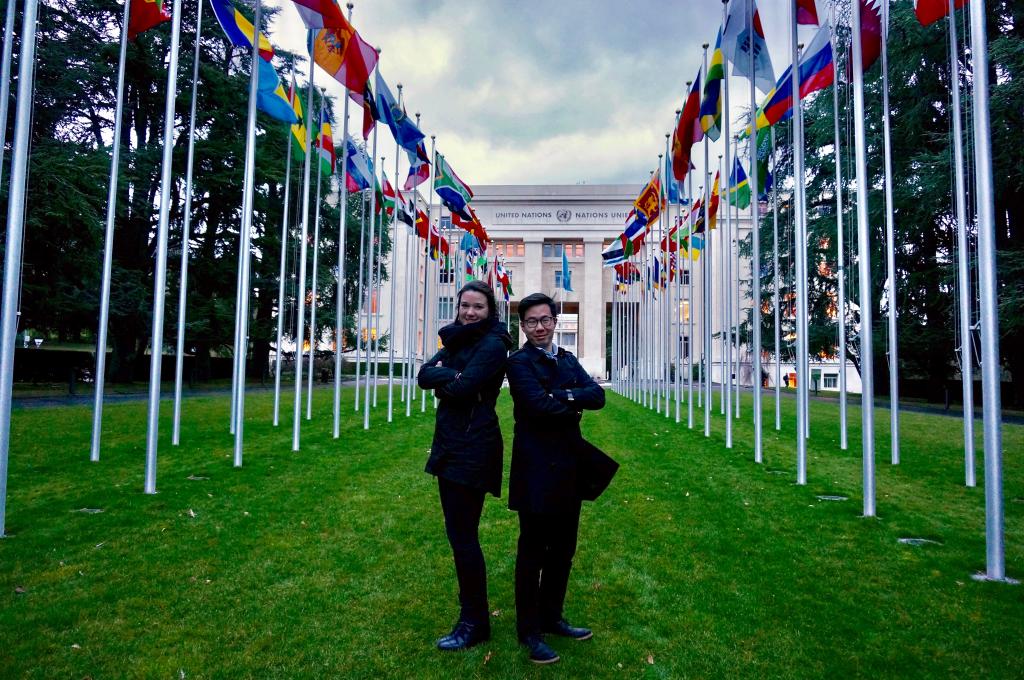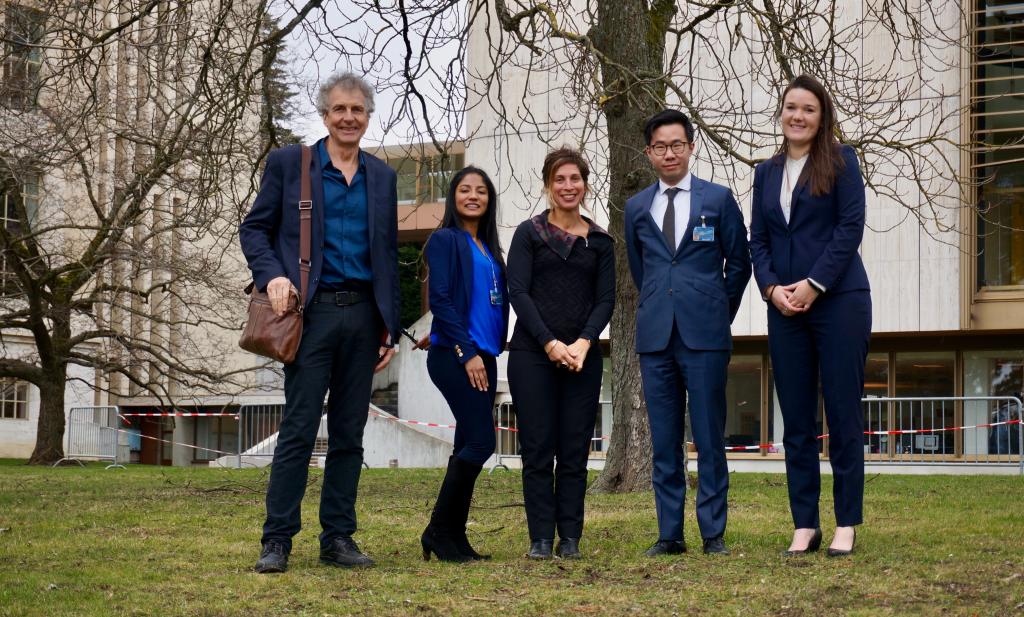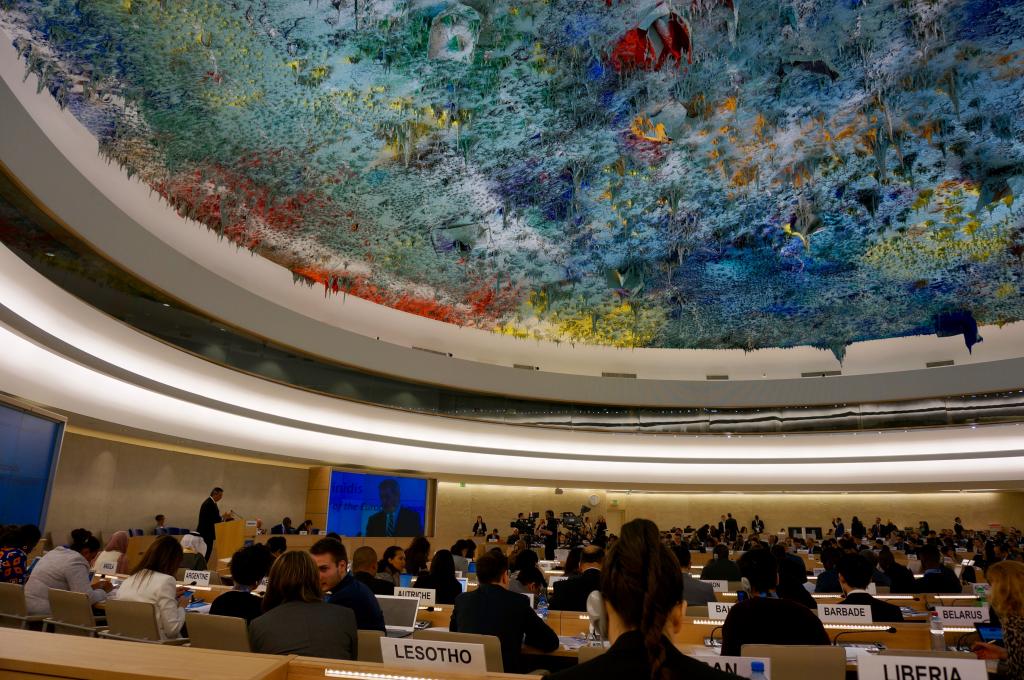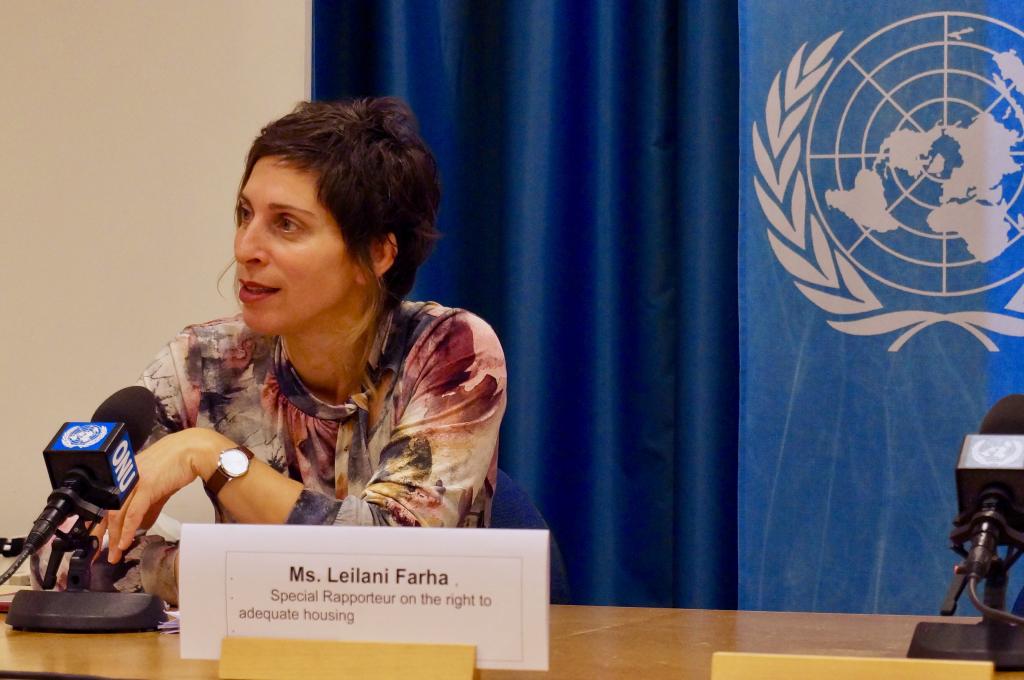Secondary menu
The Commodification of Dignity: How the global financialization of housing markets has transformed a fundamental human right into a commodity
30 March, 2017
Karlson Leung (2L) & Faye Williams (JD/MGA 2L)

The authors, Faye and Karlson, striking a pose in front of the UN Office at Geneva. Photograph courtesy of Karlson Leung.
Walking along the pavement in an urban downtown core, the glittering facades of glass high rises and expensive condos around you obscure the daily struggles of those left without proper housing. “Spare some change? God bless. Spare some change? God bless,” falls into beat with your morning commute. You take a moment to wonder about this person. Did they lose their job? Were they evicted from their home? Are they suffering from mental illness or addiction? Perhaps. In addition to these personal circumstances, however, there are larger, systemic forces resulting in over 100 million homeless and another 1.5 billion people living in inadequate housing around the world.
On March 1, 2017, the United Nations Special Rapporteur on the right to adequate housing, Leilani Farha, presented her thematic report on one of these larger, systemic forces - the financialization of housing - during the 34th session of the Human Rights Council at the United Nations Office in Geneva. We worked on this report with Ms. Farha over the course of the year as clinic students of the International Human Rights Program and accompanied her to Geneva to attend the Human Rights Council session.

Leilani Farha, the UN Special Rapporteur on the right to adequate housing, with her team in front of the UN Office at Geneva. From left to right: Bruce Porter, senior advisor to the Special Rapporteur; Yashwinie Shivanand, MGA candidate at the Munk School of Global Affairs; Karlson Leung, JD candidate at the University of Toronto’s Faculty of Law; and Faye Williams, JD/MGA candidate at the University of Toronto’s Faculty of Law and the Munk School of Global Affairs. Photograph courtesy of Karlson Leung.
The right to adequate housing
Article 11 of the United Nations Covenant on Economic, Social and Cultural Rights provides for a right to adequate housing. Housing is considered inadequate when: (1) its cost threatens occupants’ enjoyment of other human rights; (2) it does not provide sufficient protection from weather elements and other threats to health; (3) it does not account for the specific needs of disadvantaged and marginalized groups (such as the poor, people facing discrimination, and persons with disabilities); (4) there is a risk of forced eviction, harassment or other threats; (5) its occupants do not have safe drinking water, adequate sanitation, energy for cooking, heating and lighting, sanitation and washing facilities, means of food storage and refuse disposal; (6) it is located far from employment options, health care services, schools, child care centres and other social facilities, or is located in close proximity to polluted sites or pollution sources.
The UN Special Rapporteur on the right to adequate housing is tasked with monitoring, advising, and reporting on this right, and whether it is upheld by UN member states. The Special Rapporteur also responds to individual complaints related to the right to adequate housing, conducts country studies, provides recommendations on technical cooperation at the country level, and engages in general promotional activities related to the human rights issue.
The Special Rapporteur’s message for the assembly of the Human Rights Council earlier this month was that the right to adequate housing is being threatened by the financialization of housing, and governments have an obligation to intervene to protect their citizens.

Inside the 34th session of the Human Rights Council. Photography by Karlson Leung.
What is financialization of housing?
Since the Industrial Revolution, the notion of the home as a place to live in dignity has slowly given way to invisible market forces that consider housing a vehicle for the accumulation of wealth. The term “financialization of housing” refers to structural changes in global investment and housing and financial markets, whereby housing is treated as a commodity rather than as a human right.
The numbers behind these structural changes are staggering. The value of residential real estate worldwide is now valued at US $163 trillion, nearly 45 per cent of the value of all global assets. The transnational financial elite use housing as a place to park capital, particularly in “hedge cities” like Hong Kong, London, Munich, Stockholm, Sydney and Vancouver. These massive influxes of capital do not lead to corresponding benefits for the local population because a significant portion of investor-owned homes are simply left empty. In Melbourne, Australia, for example, 82,000 or one-fifth of investor-owned units lie empty. In the affluent London boroughs of Chelsea and Kensington, prime locations for wealthy foreign investors, the number of vacant units increased 40 per cent between 2013 and 2014.
Those making decisions about housing - its use, its cost, where it will be built or whether it will be demolished - do so from remote boardrooms with no engagement with or accountability to the communities in which their “assets” are located. More than 36,000 properties in London are held by shell companies registered in offshore havens such as Bermuda, the British Virgin Islands, the Isle of Man and Jersey. Here in Toronto, an estimated 99,000 condo units and homes are left empty, while rents and housing prices are rising out of reach for many. These decisions drive up housing prices and fundamentally alter the character of neighbourhoods.
Increased housing prices drive greater wealth inequality. Those who own property in prime urban locations – whether they live there or not – become richer, while lower-income households confronting the escalating costs of housing become poorer. Private investment of this nature also perpetuates spatial segregation and inequality by relegating poorer visible minority populations to peri-urban areas where employment opportunities are scarce. In South Africa, for example, the impact of private investment in the urban centres has sustained the discriminatory patterns of the apartheid area, with wealthier, predominantly white households occupying areas close to the centre and poorer black South Africans living on the periphery.
In many countries in the Global South, where the majority of households are unlikely to have access to formal credit, the impact of financialization is experienced differently than the Global North, but with a common theme — the subversion of housing and land as social goods in favour of their value as commodities for the accumulation of wealth. Informal settlements in Southern cities are regularly demolished for luxury housing and commercial development such as shopping malls and other high-end services intended for those with expendable incomes. In Lagos, Nigeria, for example, 30,000 residents of the Otodo Gbame community were forcibly displaced after their waterfront homes were destroyed to make way for luxury developments. The World Bank and other international and regional financial institutions continue to actively promote the financialization of housing as the dominant strategy for addressing the crucial need for housing in developing economies, despite evidence that such strategies fail to provide housing options to those that are most in need.
Without intervention, these trends are set to continue. The financialization of housing will gut neighbourhoods and communities of their culture, diversity, and social function, making cities unlivable for many. If even a portion of capital accrued through the processes of financialization were directed toward affordable housing and access to credit for people most in need of it, access to adequate, safe and affordable housing for all would be well within reach.

Leilani Farha speaking during a press conference at the UN Office in Geneva. Photography by Karlson Leung.
The Special Rapporteur’s message to the Human Rights Council
Earlier this month, we arrived on a sunny morning in Geneva as the high-level session of member states was already underway at the United Nations Human Rights council. The scene at the Palais des Nations was bustling with representatives from all member states and many civil society organizations. We were fortunate that someone on Ms. Farha’s team secured us seats on the assembly floor so we could take in the magnificent multi-coloured ceiling above.
Ms. Farha was one of the first of the Special Rapporteurs to take the podium after the high-level opening session of member states wrapped up. Ms. Farha reported on the human rights impact of excessive global investment in housing in the global North and South alike. She gave examples of state complicity in the commodification of housing, expressing concern that government accountability to international human rights obligations has been replaced with accountability to markets and investors. Ms. Farha ultimately called for a fundamental paradigm shift, whereby the notion of housing as a commodity is replaced with the value of housing as a fundamental human right.
Concretely, what would this look like? Ms. Farha made several recommendations to states, including: recognizing the paramountcy of human rights in trade and investment treaties, which at the moment guarantee protections for investors from damages to communities caused by poorly regulated investments; developing new business and human rights guidelines specifically for financial actors operating in the housing sector; and reviewing laws and policies related to foreclosure, indebtedness and housing to ensure consistency with the right to adequate housing, including the obligation to prevent evictions to homelessness.
On the floor of the resonant Human Rights Council assembly, we listened through our earpieces to the crackling voices of UN interpreters as member states reaffirmed their commitments to human rights obligations to uphold the right to adequate housing. Ms. Farha’s report was well-received, and many delegates took the opportunity to speak about their domestic housing policies and programs they have implemented to protect and ensure fulfillment to the right to adequate housing.
There is a long way to go, however, before the idea of a home, the most basic of building blocks to other fundamental human rights, returns within the grasp of those who have had their dignity stripped by the forces of financialization.
